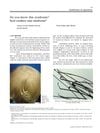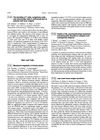 January 2008 in “Springer eBooks”
January 2008 in “Springer eBooks” Thyroid disease can cause hair loss and treating thyroid problems might help with hair disorders.
 May 2007 in “Dermatologic Therapy”
May 2007 in “Dermatologic Therapy” Hair care practices like using relaxers and tight braiding can lead to permanent hair loss in black women.

The document concludes that Loose Anagen Hair Syndrome is a benign condition where hair is thin and easily pulled out, often improving with age.
 November 2004 in “John Wiley & Sons, Ltd eBooks”
November 2004 in “John Wiley & Sons, Ltd eBooks” Insulin resistance is linked to PCOS and can lead to other health issues, but treatments like metformin can help manage symptoms.

Spironolactone with an oral contraceptive improved hair growth in women with hirsutism.
 May 2003 in “Facial Plastic Surgery Clinics of North America”
May 2003 in “Facial Plastic Surgery Clinics of North America” Hair loss can be treated with medications like minoxidil and finasteride or surgery, but treatment effectiveness varies by alopecia type and accurate diagnosis is important.
 September 2002 in “Comprehensive Therapy”
September 2002 in “Comprehensive Therapy” Primary care is key in managing PCOS, focusing on lifestyle changes and medications like birth control and metformin.
 September 1998 in “JEADV. Journal of the European Academy of Dermatology and Venereology/Journal of the European Academy of Dermatology and Venereology”
September 1998 in “JEADV. Journal of the European Academy of Dermatology and Venereology/Journal of the European Academy of Dermatology and Venereology” The document concludes that individualized treatments for hair issues are effective, certain hair changes can indicate neurocutaneous diseases, specific lotions improve skin health, laser hair removal works but needs more study on long-term effects, men's cosmetics are diverse, peeling is effective but can have side effects, and facial pigmentation is often due to overactive skin cells.
 September 1998 in “JEADV. Journal of the European Academy of Dermatology and Venereology/Journal of the European Academy of Dermatology and Venereology”
September 1998 in “JEADV. Journal of the European Academy of Dermatology and Venereology/Journal of the European Academy of Dermatology and Venereology” Hair changes could indicate neurological diseases and help monitor treatment.
 September 1997 in “Journal of the European Academy of Dermatology and Venereology”
September 1997 in “Journal of the European Academy of Dermatology and Venereology” Adults can develop late-onset loose anagen syndrome, which may often be misdiagnosed.
 September 1997 in “Journal of the European Academy of Dermatology and Venereology”
September 1997 in “Journal of the European Academy of Dermatology and Venereology” People with acne have more CD4+ immune cells in their skin than healthy people.
 August 1996 in “Journal of Pediatric and Adolescent Gynecology”
August 1996 in “Journal of Pediatric and Adolescent Gynecology” The document concludes that PCOS in adolescents is complex and requires comprehensive care to manage its symptoms and associated health risks.
 January 1991 in “Journal of Pediatric Health Care”
January 1991 in “Journal of Pediatric Health Care” Hair loss in children can be caused by fungal infections, trauma, autoimmune disorders, or stress, and treatments vary depending on the cause.
 July 2021 in “Archives of Dermatological Research”
July 2021 in “Archives of Dermatological Research” Alopecia patients have less GPER-1, which might affect hair loss.
 August 2019 in “Journal of The American Academy of Dermatology”
August 2019 in “Journal of The American Academy of Dermatology” No link found between hair loss severity and PSA levels in men.
 July 2019 in “Journal of The American Academy of Dermatology”
July 2019 in “Journal of The American Academy of Dermatology” Lab tests for female hair loss have unclear usefulness; consider based on symptoms.
 April 2019 in “Journal of the Dermatology Nurses’ Association”
April 2019 in “Journal of the Dermatology Nurses’ Association” A 37-year-old man with hair loss and skin issues was successfully treated with oral antibiotics, highlighting the need for early treatment. Long-term care includes low-dose antibiotics and avoiding caps and wigs.

Hair loss in African American women, caused by hair care, genetics, and environment, needs more research for better treatment.
 April 2016 in “Journal of The American Academy of Dermatology”
April 2016 in “Journal of The American Academy of Dermatology” Alopecia areata affects quality of life more than androgenetic alopecia.
 September 1997 in “Journal of The European Academy of Dermatology and Venereology”
September 1997 in “Journal of The European Academy of Dermatology and Venereology” Alopecia linked to higher anxiety and personality disorders.
 1533 citations,
October 2008 in “Endocrine reviews”
1533 citations,
October 2008 in “Endocrine reviews” Mice without the vitamin D receptor have bone issues and other health problems, suggesting vitamin D is important for preventing various diseases in humans.
 989 citations,
August 2007 in “The Lancet”
989 citations,
August 2007 in “The Lancet” PCOS is a complex condition with major health impacts, needing more research for better diagnosis and treatment.
 926 citations,
June 2010 in “BMC Medicine”
926 citations,
June 2010 in “BMC Medicine” Polycystic ovary syndrome is a complex condition that affects women's mental, reproductive, and metabolic health throughout their lives.
 633 citations,
September 1998 in “The Journal of Clinical Endocrinology and Metabolism”
633 citations,
September 1998 in “The Journal of Clinical Endocrinology and Metabolism” PCOS affects a similar percentage of Black and White women in the Southeastern United States.
 521 citations,
January 1954 in “Physiological Reviews”
521 citations,
January 1954 in “Physiological Reviews” Hair growth is cyclic and influenced mainly by local factors.
 475 citations,
January 2016 in “International Review of Psychiatry”
475 citations,
January 2016 in “International Review of Psychiatry” The document concludes that non-binary individuals need compassionate support and recognition in healthcare, without being pathologized.
 416 citations,
September 1997 in “Journal of Investigative Dermatology”
416 citations,
September 1997 in “Journal of Investigative Dermatology” People with hair loss have more androgen receptors and enzymes in certain follicles, with men and women showing different patterns.
 391 citations,
January 2010 in “Journal of The American Academy of Dermatology”
391 citations,
January 2010 in “Journal of The American Academy of Dermatology” Half of people with Alopecia Areata may see hair regrowth within a year without treatment, but recovery is unpredictable.
 378 citations,
September 1998 in “The Journal of Clinical Endocrinology and Metabolism”
378 citations,
September 1998 in “The Journal of Clinical Endocrinology and Metabolism” PCOS affects about 4% of women in the southeastern U.S. equally across Black and White populations.
 373 citations,
September 2009 in “Obstetrics & Gynecology”
373 citations,
September 2009 in “Obstetrics & Gynecology” The bulletin provides guidelines for diagnosing and managing PCOS, suggesting weight loss, hormonal contraceptives, and diabetes screening, with clomiphene for infertility and various treatments for excess hair.






























